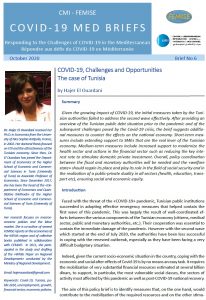
The recent coronavirus crisis threatens the health, economies and societies of all countries. In Southern and Eastern Mediterranean countries, the fight against the pandemic is even more complicated. Cooperation and EU-Med strategies in key sectors are needed. Therefore, the Center for Mediterranean Integration (CMI) and FEMISE join forces and launch their joint series of Policy Briefs called “COVID-19 MED BRIEFS” to pave the way for thematic analyses and policy relevant recommendations.
 The sixth COVID-19 MED BRIEF, entitled “COVID-19, Challenges and Opportunities The case of Tunisia” by Hajer El Ouardani, Associate Professor, Department of Economics at the Higher School of Economic and Commercial
The sixth COVID-19 MED BRIEF, entitled “COVID-19, Challenges and Opportunities The case of Tunisia” by Hajer El Ouardani, Associate Professor, Department of Economics at the Higher School of Economic and Commercial
Sciences in Tunis (University of Tunis) is available here.
Summary: Given the growing impact of COVID-19, the initial measures taken by the Tunisian authorities failed to address the second wave effectively. After providing an overview of the Tunisian public debt situation prior to the pandemic and of the subsequent challenges posed by the Covid-19 crisis, the brief suggests additional measures to counter the effects on the national economy.
Short-term measures include extending support to SMEs that are the real lever of the Tunisian economy. Medium-term measures include increased support to modernize the health sector and actions in the financial sector such as reducing the key interest rate to stimulate domestic private investment.
Overall, policy coordination between the fiscal and monetary authorities will be needed and the «welfare state» should regain its place and play its role in the field of social security and in the realization of a public-private duality in all sectors (health, education, transport etc), ensuring social and economic equity.
This Policy Brief is produced as part of the series of Policy Briefs on « Responding to the Challenges of COVID-19 in the Mediterranean » that is undertaken in partnership between FEMISE and the Center for Mediterranean Integration (CMI).
The views expressed in this Brief are those of the authors and do not reflect the views of CMI or FEMISE. The contents have not been subjected to verification by CMI or FEMISE and their publication does not reflect ownership by CMI or FEMISE.


